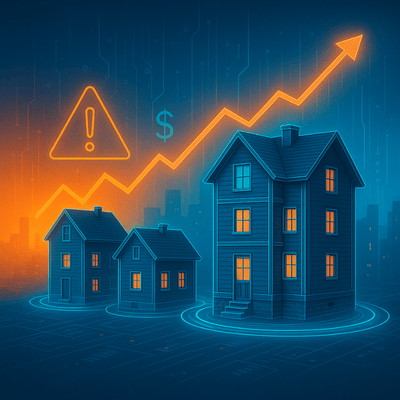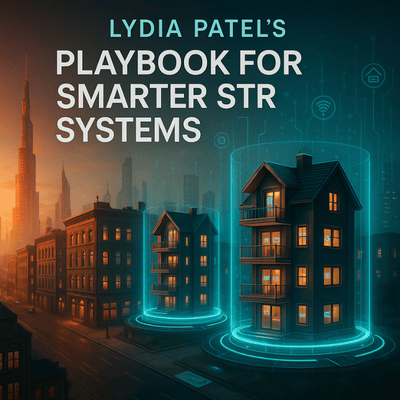How to build an Airbnb Business: How Self-Driving Cars will Change Real Estate Forever
Join us on this week’s episode of the Short-Term Rental Riches podcast as we dive into a fascinating topic that’s poised to reshape the world of real estate: the impact of autonomous vehicles.
In the ever-evolving landscape of real estate investing, demographic shifts and societal changes play a pivotal role in shaping supply, demand, and property values. Think of the seismic shift brought about by remote work – a game-changer for our society. But there’s another transformative shift on the horizon, one that’s not as far away as you might think, and it’s going to have a profound impact on real estate that might not be on your radar just yet.
I recently returned from California, where the beauty of the state was a striking backdrop to ponder the future of real estate. Drawing on personal experiences and industry insights, we’ll delve into the realm of autonomous vehicles – a revolutionary development that’s quickly gaining momentum. From Tesla’s strides in self-driving technology to the intriguing world of autonomous Ubers, the future is closer than you imagine.
Discover how this technological wave will ripple through the fabric of real estate. The traditional mantra of “location, location, location” might take a backseat as the importance of access and commuting changes the game. Imagine a world with reduced traffic congestion, fewer parking garages, and a society on the move like never before.
The dates for our Virtual Event in October are now up! Find out more here
You can find all of our links here including our recommended resources, short-term rental playbook, Instagram, and more!
Click Here to view TranscriptThe fundamentals of real estate investing come down to demographics and societal shifts. Those impacts, supply and demand, they impact the way we live. A societal shift like working from home, right? That really changed things up in our society. Well, I have one other that’s coming, and it might not be that far away, that’s definitely going to have an impact on real estate. And it’s one you probably haven’t been thinking about too much. Stay tuned as we jump into that on this week’s episode of the Short-Term Rental Riches podcast.
Welcome to short-term rental riches. We’ll discuss investing in real estate but with a specific focus on short-term rentals. Quick, Actionable items to Acquire, Manage and Scale your portfolio. I’m your host Tim Hubbard.
Welcome back to the Short-Term Rental Riches podcast. Happy you’re here again. I just got back from a nice little trip to California. California, that’s where I’m originally from, although I haven’t lived there in quite a long time. Coming to you live down here in Colombia, this beautiful city behind me, amazing views. If you haven’t been here before and you get the chance, I highly suggest checking it out. But anyway, I had a great time in California too. California is a beautiful state and I know I pick on it a lot because of the regulations and the lack of landlord friendliness. I still own properties there today, but I’ve sold most of mine invested in other markets as most of you know that have listened to this podcast for a while. But there’s no doubt about it, it is a beautiful state. And so, it was a really good time. Got to do some wine tasting, drove around Napa. My families from Sacramento, visited with family, friends. And while we’re there, we went to a wedding as well with a good friend in Tahoe, which is a beautiful place. If you’ve never been there, I highly suggest you check that out as well. And my friend picked us up. I don’t have a car there in California anymore. And so, I luckily got to go with him, but it was great. We got to chat the whole while along. And we drove up in his Tesla and he has a newer Tesla. Obviously, we know Tesla’s have some self-driving capabilities, but the reality is they’re basically there. They can pretty much drive themselves. And I know that the idea of self-driving cars is not new to us. It’s becoming more and more familiar. I remember being in San Francisco years ago. I mean, this was probably a decade ago and I was driving, I was working a different job. I think I was building my real estate portfolio at that time, but I was also doing some other jobs on the side. Remember looking next to me on the freeway, I was stuck in traffic, good old San Francisco traffic. And there’s this van next to me and I look a little more closely and there’s no one in the driver’s seat. And this was actually, this was probably more than 10 years ago. It’s probably like 15 years ago. Up on the roof was a giant satellite sort of GPS system. And there was someone in the passenger seat, but no one driving this van. And that was a really long time ago. And now we’re seeing all the biggest car manufacturers come out with electric vehicles. A lot of them with self-driving capabilities. Tesla, I think has been leading the front on this, but there’s a whole bunch of them now. They’re doing this with 18-wheeler semi-trucks. They’re doing this with Uber experiments so that there’s autonomous vehicles with no one actually driving it. And so, this is coming. This is definitely coming. I think it’s closer than a lot of us might think. And it’s going to have some serious impacts on our real estate. So, I want to talk about a few of those today.
The first one is that we’ve always thought about real estate as location, location, location, right? It’s always come down to location. We want to be near attractions. We want to be near a beautiful lake or mountains or the ski resort or whatever it happens to be. But a lot of that has to do with the distance to get to that place. And so, if we don’t actually have to drive ourselves in the future and maybe we can just sit down and get some work done, maybe the same work that we could do at a remote office now, well then, the location becomes slightly less important. I’m going to go through sort of my thoughts on what I see happening to suburban type real estate versus downtown. But before we do, let’s just think about this. If we don’t have to drive ourselves in the future, and of course this isn’t going to happen overnight, but it’s already happening in places, well then, we’re not going to need as many parking garages, are we? And what takes up a lot of space in downtown markets? Those are parking garages, so those could be used for something else. A lot of mechanical vehicles need a lot of repairs. They need regular maintenance. In fact, I used to work with repair shops for years selling software, business management software, so I saw this all the time. And there are shops in all the U.S., across the world, and we’re not going to need as many of those if we have all electric cars in the future, right? So as autonomous vehicles become more and more common, we’re not going to need a place to park them most of the time. And that’s one of the beautiful things about it.
All these parking garages that we have in downtown areas that’s really expensive real estate, we’re not really going to need those anymore, right? If our car can just drop us off and pick us up later. So, this brings up the question, well, there’s not that much issue. It’s not a big challenge getting downtown. And what’s going to happen to the prices outside of downtown in a suburban area, for example? I think depending on the market, that they’re probably going to be equaled out just a little bit more. Now, I still think personally that people are going to want to live in downtown areas. I think people like to be next to people. And if people can walk, they love to do that too. That’s where a lot of my properties are, a lot of my short-term rentals. So, I think instead of location, location, location, it’s probably going to come down a little more. And this is just generally speaking to access, maybe access, access, access, right? Because if you’re living outside of downtown, you’re maybe let’s say you’re 20 minutes away with a little bit of traffic driving yourself. That’s the other thing that’s going to happen with autonomous vehicles is that they’re going to drive a little better. They don’t get tired. They’re not going to fall asleep. They’re not going to look at accidents as they drive down the freeway, which causes congestion and traffic. So theoretically, traffic should be a little better too. So, if we’re living right outside of a downtown area that now takes us 30 minutes to get to, and in the future, of course, this is not going to happen overnight. It’s going to take quite a bit of time. But in the future, it only takes 10 minutes to get to that downtown area. Then I think those prices might level out just a little bit. And you might be thinking, well, if it’s easier to get downtown, then the prices downtown should go down too, right? There’s going to be a little less demand there, but not necessarily. I mean, what’s going to happen with these parking garages? What if they get turned into more restaurants? There could be lots of new use cases. So, I don’t think that’s necessarily going to affect downtown prices as much as we might think. So, how’s this going to affect our short-term rentals? Well, of course, it could affect the property values a little bit. It really comes down to knowing our guests, right? We talk about this all the time. Is the guest coming to your property? Are they someone that’s driving typically? We need to know that, right? Are they someone that’s going to need a parking spot? We need to know that. So, if you have a downtown property, a lot of times this is where we need parking and it’s hard to come by. If someone doesn’t have to drive themselves around anymore or rent a car, it’s just much easier to get around, then that’s not going to be as important.
Now, I think drive to destinations, someone’s probably not going to take an autonomous vehicle or an autonomous Uber, for example, for three hours to a destination because it’s probably going to be a little too costly. So, we just need to know what types of guests are visiting our properties. If you’re doing a lot of medium-term stays, a lot of times people like to have a car when they’re staying for several months at a time too. So again, I think this is going to come down to what the prices are to travel around an Uber or to travel around an autonomous Uber. And I think those prices are going to be a little bit more expensive. So, if you’re going to be driving themselves, one of the things a lot of people are talking about is that we’re going to enter our cars into the shared economy as well, just like we have with Airbnb. So, think about that. You buy a car, you only use it when you need it and the rest of the time it’s making you money. Now, this might not sound too unfamiliar to you because yes, this already exists, except for it exists for vehicles that you rent and actually have to drive, right? They’re not autonomous vehicles. You have to be the driver. And I’m talking about Turo. So, I actually just rented a car when we’re in California too on Turo. It was amazing. It’s where someone has a car, just like Airbnb, where someone has a house. When they’re not using it, they can rent it out. So, someone dropped off. We rented a nice little fun car to do some wine tasting, convertible. It was a great time. But they dropped off the car at my parents’ house where I was staying and they picked it up. When we were done, it unlocked itself just like the automatic locks that we use on our properties now or that you should be using. And so, I don’t think we’re that that far away. At least the concept of this already exists and it’s something that a lot of people are already accepting. So, it’s definitely going to shape our society a little bit. And when our society gets shaped differently, so do the real estate prices. So, some of the benefits to autonomous driving are just obvious, right? But I want to cover them sort of in a nutshell because I’m actually really excited about it. I technically still own a car in the U.S. and I used to have one down here in Colombia, but I don’t really like driving that much. I actually prefer to take Uber because a lot of times I like to work or read or do something on my phone while we’re driving around. So obviously that’s one of the big reasons autonomous vehicles are going to be a big benefit. We can get our time back, right? We weren’t meant, I don’t think, to be doing the same thing over and over, kind of like robots. When we’re driving, that’s kind of what’s happening. I used to drive so much, although I did get a lot of good audio book time in.
So, if we’re taking advantage of that time, it can still be helpful. But I think the majority of us would prefer to drive less if we didn’t have to. And I know a lot of the people that we’re hiring and bringing on our team, this is the same situation for them. I just interviewed three people yesterday that used to work with Airbnb. One of them just joined our team. So really excited to have them on. But they’re out of the Philippines. They worked in a call center for Airbnb and they all had to commute. And then when COVID happened, they didn’t have to commute. And now quite a bit of time later, they’re asking them to go back to the office and they just didn’t want to do it. And so luckily for us, we picked up some great talent, but this is just the reality. Things are changing. People don’t really like these commutes if we don’t have to do them. So, this can buy back a round easier that can’t actually do that right now. I’m talking about elderly people and maybe someone that lost their driver’s license or maybe someone that’s partially impaired or can’t see. This allows them to use these services as well. We talked about aging before on a prior episode, actually episode 150 and how the aging demographic is also changing real estate and where demand is going. So, if you missed that one, go back and check it out. The reality is these big societal changes change the way we live and they change the prices of our real estate. If we look at Amazon, they’ve changed the way retail works. Retail is having a really hard time right now. Working from home has changed the way that we used to work in offices. Offices are getting hammered right now across the nation. And unfortunately, I don’t see an easy solution to that. Most of these office buildings are not ripe for apartment conversion like a lot of people think. It actually costs more to convert some of these office buildings than it would to just build apartments from scratch. So, we just need to be ahead of these things. I know this self-driving one is kind of out there. It’s in the future. I personally think it’s going to be awesome. It’s going to help ease traffic. It’s going to help buy back our time. It’s going to make the value and demand of our properties change depending on where they’re at. Could make it much easier for our short-term rental guests coming to visit us, assuming that the prices to use these services is reasonable. So, I’m bullish on it. I think it’s great. In the end, it’s going to make people more mobile. They’re going to move around more, obviously. Duh, Tim. And I also think that means they’re going to travel more. They’re going to have an easier time living in short-term rentals, which is a huge trend that we’re seeing. And I’m excited to see it continue.
So, I hope that gave you a little bit of insight. I know this is really far down the road. The good news with real estate is that we always got to live somewhere, right? And so hopefully, you’re picking your real estate investments wisely. And until next time, I hope you have a fabulous week.
Want to get on the fast track to Financial Freedom through short-term rentals what all starts with the properties you acquire but you want to make sure that you acquired the right properties. I want to give you my e-book that will show you how to do just that. There is no charge, It’s my gift to you for being one of our subscribers. Just go to restmethods.com. That’s R-E-S-T methods.com
RELATED PODCAST EPISODES















